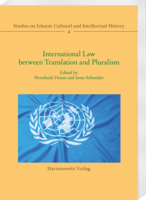|
|
more titles of the subject:
Download:
Please note: With adding digital Products to your cart
the payment will be handled via PayPal. The download will be provided after the payment is confirmed. This volume contains contributions from three conferences held within the framework of the project “Law between Dialogue and Translation (The Example of Palestine)”, funded by the German Academic Exchange Service (DAAD). The conferences were hosted by the project partners from the Department for Arabic and Islamic Studies of the University of Göttingen (Germany) and the Faculty of Law from Al-Quds University (Palestine) in 2019 and 2020, and the School of Graduate Studies of the State Islamic University Sunan Kalijaga Yogyakarta (Indonesia) in 2021. The project aimed to analyze how international law and human rights norms are implemented or “translated” into national legislation, with a special focus on the role of Islamic law and institutions in these processes.
The volume provides a theoretical introduction on the concepts of “translation” of law and of “legal pluralism” and continues to discuss four main areas in which different practical aspects of these concepts can be observed: 1) the dealing of German and Palestinian judicial institutions with the relation between state, religion and rights of the individual, 2) achievements and challenges of women’s rights implementation in Indonesia, 3) the entanglement of Sharia, Customary and State law in Palestine, and 4) recent developments in international criminal and humanitarian law in the Palestinian context. |
|||||||||||||||||||||||||||||||||||||||||






